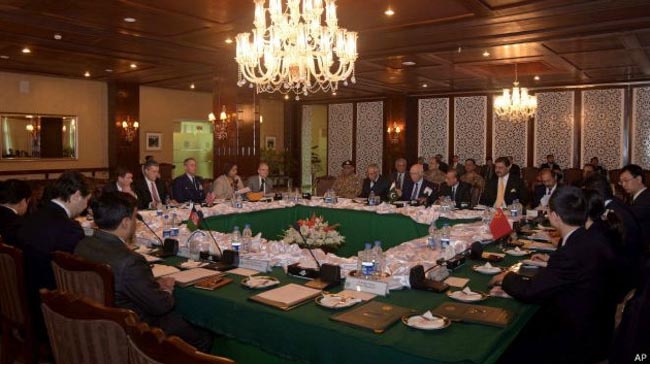The quadrilateral talks in Islamabad for establishing a roadmap for peace process in Afghanistan ended with the participants agreeing on continuing the talks for exploring ways to resume negotiations between the government of Afghanistan and the Taliban. According to officials, the next four-way meeting of representatives of Afghanistan, Pakistan, China and the US would be held in Kabul next week. The statement released at the end of the meeting said that the participants of the meeting emphasized on ending the violence and resumption of peace negotiations between the Afghan government and the Taliban. The meeting of the quadrilateral coordination group in Islamabad is coming as a major development for the Afghan peace efforts after the previous direct talks between the two sides failed last year.
Afghanistan and Pakistan hope the meeting would result to reach a common ground on key issues of peace talks among key stakeholders particularly Kabul and Islamabad. The statement said that the talks in Islamabad were focused on “clear and realistic assessment” of opportunities for peace in Afghanistan as well as the hurdles for talks with the Taliban. Reaching a common ground by Afghanistan and Pakistan over the process would be key for success of talks with the Taliban. The previous efforts between Afghanistan and Pakistan aimed at reaching a common ground over the process have so far been unproductive. The most notable achievement from the ongoing talks would be a substantial understanding between Kabul and Islamabad over the process and a likely peace deal between the government and the Taliban.
There are much ambiguities involved with the efforts for starting peace talks with the Taliban as there is not a clear understanding between Kabul and Islamabad over the conditions of the process. The Afghan and Pakistani governments need to talk over all aspects of the peace process with the Taliban as well as expectations of Kabul and Islamabad from the peace process and a likely deal with the Taliban. The process to conclude the pre-peace talks negotiations between the four key parties may take a long time; however, it would remain crucial a prerequisite for resumption of negotiations between Taliban leaders and the Afghan government. Pakistan has hinted its commitment to take action against those Taliban factions who do not enter in peace negotiations. If Kabul and Islamabad do not reach a clear understanding on what circumstances the Pakistani side would take military action against the Taliban, this would result to further disappointments between the two sides. Pakistan needs to remain committed to its obligations and act upon its promises it makes to the Afghan government. There have been always major differences between Afghanistan and Pakistan over security in Afghanistan and issues related to peace talks with the Taliban. Pakistan is seen as having control over the Taliban and would have a major role in the peace talks with the group in the future. Afghanistan insists circles in the powerful military and intelligence of Pakistan are supporting the Taliban to mount their campaign of violence in Afghanistan. Pakistan’s links with the Taliban would remain a tricky issue in the ongoing talks between the two countries for drawing a roadmap for the peace negotiations with the Taliban. Afghanistan and Pakistan both holds long-standing skepticisms against each other which fails the two sides to talk frankly over the trickiest issues related to peace and stability in both the countries. And they seem now to take the initial steps for reaching such understandings. It would be a major success for the prospect of the peace in Afghanistan if the Afghan and Pakistani governments reach important agreements, or broad understanding, for the peace process.
The presence of two major world players China and the US is viewed as a milestone for the talks to pave the way for negotiations with the Taliban. The United States and China both have considerable influence over the governments of Afghanistan and Pakistan as both are major supporters of the Afghan government, and both are key allies of Pakistan. Pakistan expects the Afghan government to reduce influence of anti-Pakistan elements in Kabul over the relations between the two countries and curb the impacts of their hardline stance over the peace process. In the meantime, Pakistan has long been skeptical of Afghanistan’s expanding relations with India, an archrival of Pakistan. This is while India has been a key regional supporter of Afghanistan, and the country has contributed billions of dollars in development of Afghanistan. The government of Afghanistan sees India’s role indispensible to development of Afghanistan.
Any objective assessment of the opportunities for peace talks would need to “clearly and realistically” consider all these issues between the two countries which are directly related to peace talks with the Taliban. Pakistan and Afghanistan need to make compromises over the terms of the peace process and the conditions of a likely peace deal with the Taliban. The Afghan government will need to consider political concessions and some sort of power-sharing with the Taliban to end the bloody conflict in the country. However, all parties including Pakistan and the Taliban will need to realize that the Afghan constitution is not up to any talks and Afghanistan’s sovereignty and integrity must be respected. On other hand, the Afghanistan cannot make any compromises over its relations with India or any other countries as it violates integrity and long-term interests of Afghanistan. However, in order to ease Pakistan’s skepticisms, Afghanistan will be able to establish balanced relations with India as it needs to have balanced and friendly relations with both the South Asian countries.
It would best for interests of Afghanistan and Pakistan to curb influence of circles in both countries that pursue agendas against another country. This way the two countries would be able to start restoring trusts in the mutual relations and in the joint efforts for the Afghan peace talks.

